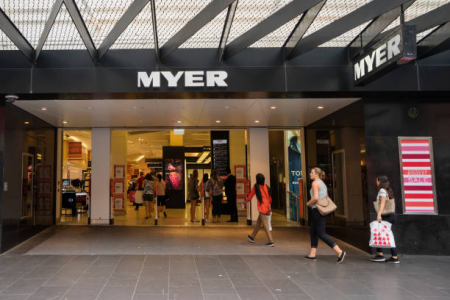Major retailer faces alarming downturn as profits and shares tumble
By
Gian T
- Replies 0
It’s been a tough week for one of Australia’s most loved retail icons, and if you’ve ever wandered the aisles searching for a bargain or the perfect gift, you might want to sit down for this one.
The 124-year-old department store chain is facing what some experts are calling a 'make or break' year, after a dramatic plunge in profits, a string of store closures, and a share market crash that’s left investors reeling.
On Tuesday, Myer revealed that its operating profit had collapsed by nearly a third in the 12 months leading up to 26 July.
The culprit is a sluggish consumer spending and the kind of tough economic conditions that have many Aussies tightening their belts.
The news sent shockwaves through the stock market, with Myer shares tumbling 15 per cent at the opening bell and nosediving to a 29 per cent loss by midday, trading at just $0.46—a far cry from the glory days.
The numbers paint a sobering picture: operating profit after tax fell to $36.8 million, down 30 per cent from the previous year.
But the real kicker was a whopping $211.2 million statutory loss, thanks in large part to a writedown in the value of five fashion brands Myer recently acquired from Premier Investments: Just Jeans, Jay Jays, Jacqui E, Portmans, and Dotti. Ouch.
As a result, shareholders were left empty-handed, with the company declaring no final dividend.
Executive chairwoman Olivia Wirth, who’s no stranger to steering big ships through stormy seas (she’s the former Qantas loyalty chief), tried to reassure everyone that 2024-25 would be a 'transition year.'
The plan is to bed down the new brands, slash $30 million in costs, and hope for sunnier skies ahead.
'Despite challenging macroeconomic conditions and tough retail markets in Australia and New Zealand, we achieved positive sales growth in our first period as a combined group,' Wirth said, trying to put a positive spin on the numbers.
But not everyone is convinced that better days are just around the corner.
Retail expert Dr Gary Mortimer issued a stark warning: the next 12 months will be critical for Myer’s survival.
He pointed out that sales for the newly acquired brands were either flat or declined in the second half of 2024-25—a worrying sign for a company betting big on these labels.
'It’s only year one of the acquisition, so it will be interesting to see how the next 12-24 months play out,' Dr Mortimer said.
'It’s been a challenging time for department stores, which have struggled in recent years. It’s early days for Myer, so the next 12 months will be telling.'
He also highlighted the broader challenges facing the retail sector: rising inflation, soaring housing costs, and a consumer base more focused on paying the bills than splurging on new clothes or homewares.
With discretionary spending down, shoppers are flocking to budget-friendly alternatives like Target, Kmart, and online giants such as Shein and Temu.
'Brands such as Dotti are highly exposed to international fast fashion retail killers,' Dr Mortimer warned.
'If they want people to spend in-store, it will require some cost-of-living relief. Myer also needs a clearer value proposition on their breadth of apparel brands.'
It’s not all doom and gloom, though. Myer’s online sales jumped a healthy 22.9 per cent over the financial year, showing that the retailer still has some tricks up its sleeve.
And in the first seven weeks of the 2025-26 year, group sales were up 3.1 per cent compared to the same period last year.
Wirth remains 'cautiously optimistic' about the year ahead, pointing to 'emerging pockets of improving consumer strength' and the expectation that recent investments will start to pay off.
The company is also rolling out a new group strategy, including a $30 million cost-cutting plan and an expansion of the popular Myer One loyalty scheme to the new apparel brands.
'In executing our Myer Group growth strategy, we are moving at pace and gaining early traction,' Wirth said, highlighting the launch of Myer One at Apparel Brands, a relaunch of the loyalty program, and new store formats for Just Jeans.
For many of us, Myer is more than just a store—it’s a part of Australian history. Founded by Sydney Myer in Bendigo back in 1900, the chain grew to become the country’s largest department store network, with more than 750 department and specialty stores across Australia and New Zealand at its peak.
But the last few years have been tough. Myer has closed flagship outlets in Hornsby, Brisbane CBD, Belconnen in Canberra, and Melbourne’s Knox, reflecting the broader challenges facing traditional department stores in the age of online shopping and fast fashion.
While the future is uncertain, one thing is clear: Myer is fighting hard to stay relevant in a rapidly changing retail landscape.
Whether it can reinvent itself and win back Aussie shoppers remains to be seen.
 Have you noticed changes at your local Myer store? Are you shopping more online these days, or do you still prefer the in-store experience? What would make you more likely to shop at Myer again? Share your stories and opinions in the comments below.
Have you noticed changes at your local Myer store? Are you shopping more online these days, or do you still prefer the in-store experience? What would make you more likely to shop at Myer again? Share your stories and opinions in the comments below.
Read more: Sidney Myer's grandson urges retail giant to refurbish Bendigo store
The 124-year-old department store chain is facing what some experts are calling a 'make or break' year, after a dramatic plunge in profits, a string of store closures, and a share market crash that’s left investors reeling.
On Tuesday, Myer revealed that its operating profit had collapsed by nearly a third in the 12 months leading up to 26 July.
The culprit is a sluggish consumer spending and the kind of tough economic conditions that have many Aussies tightening their belts.
The news sent shockwaves through the stock market, with Myer shares tumbling 15 per cent at the opening bell and nosediving to a 29 per cent loss by midday, trading at just $0.46—a far cry from the glory days.
The numbers paint a sobering picture: operating profit after tax fell to $36.8 million, down 30 per cent from the previous year.
But the real kicker was a whopping $211.2 million statutory loss, thanks in large part to a writedown in the value of five fashion brands Myer recently acquired from Premier Investments: Just Jeans, Jay Jays, Jacqui E, Portmans, and Dotti. Ouch.
As a result, shareholders were left empty-handed, with the company declaring no final dividend.
Executive chairwoman Olivia Wirth, who’s no stranger to steering big ships through stormy seas (she’s the former Qantas loyalty chief), tried to reassure everyone that 2024-25 would be a 'transition year.'
The plan is to bed down the new brands, slash $30 million in costs, and hope for sunnier skies ahead.
'Despite challenging macroeconomic conditions and tough retail markets in Australia and New Zealand, we achieved positive sales growth in our first period as a combined group,' Wirth said, trying to put a positive spin on the numbers.
But not everyone is convinced that better days are just around the corner.
Retail expert Dr Gary Mortimer issued a stark warning: the next 12 months will be critical for Myer’s survival.
'It’s only year one of the acquisition, so it will be interesting to see how the next 12-24 months play out,' Dr Mortimer said.
'It’s been a challenging time for department stores, which have struggled in recent years. It’s early days for Myer, so the next 12 months will be telling.'
He also highlighted the broader challenges facing the retail sector: rising inflation, soaring housing costs, and a consumer base more focused on paying the bills than splurging on new clothes or homewares.
With discretionary spending down, shoppers are flocking to budget-friendly alternatives like Target, Kmart, and online giants such as Shein and Temu.
'Brands such as Dotti are highly exposed to international fast fashion retail killers,' Dr Mortimer warned.
It’s not all doom and gloom, though. Myer’s online sales jumped a healthy 22.9 per cent over the financial year, showing that the retailer still has some tricks up its sleeve.
And in the first seven weeks of the 2025-26 year, group sales were up 3.1 per cent compared to the same period last year.
Wirth remains 'cautiously optimistic' about the year ahead, pointing to 'emerging pockets of improving consumer strength' and the expectation that recent investments will start to pay off.
The company is also rolling out a new group strategy, including a $30 million cost-cutting plan and an expansion of the popular Myer One loyalty scheme to the new apparel brands.
'In executing our Myer Group growth strategy, we are moving at pace and gaining early traction,' Wirth said, highlighting the launch of Myer One at Apparel Brands, a relaunch of the loyalty program, and new store formats for Just Jeans.
For many of us, Myer is more than just a store—it’s a part of Australian history. Founded by Sydney Myer in Bendigo back in 1900, the chain grew to become the country’s largest department store network, with more than 750 department and specialty stores across Australia and New Zealand at its peak.
But the last few years have been tough. Myer has closed flagship outlets in Hornsby, Brisbane CBD, Belconnen in Canberra, and Melbourne’s Knox, reflecting the broader challenges facing traditional department stores in the age of online shopping and fast fashion.
While the future is uncertain, one thing is clear: Myer is fighting hard to stay relevant in a rapidly changing retail landscape.
Whether it can reinvent itself and win back Aussie shoppers remains to be seen.
Key Takeaways
- Myer’s operating profit collapsed by nearly a third in the last financial year, leading to a 29 per cent plunge in share price and a $211.2 million statutory loss after a major writedown of newly acquired fashion brands.
- Retail expert Dr Gary Mortimer warns the next 12 months will be crucial for Myer’s future, citing continued cost-of-living pressures and tough competition from discount retailers and international fast fashion.
- Whilst sales of Myer’s new brands like Just Jeans, Jay Jays, Jacqui E, Portmans and Dotti were flat or declined, online sales jumped by almost 23 per cent and early data for the new financial year shows some sales growth.
- Myer is responding with cost-cutting and expansion of its Myer One loyalty scheme, but experts say the department store will need a clearer value proposition and some cost-of-living relief to entice shoppers back in-store.
Read more: Sidney Myer's grandson urges retail giant to refurbish Bendigo store








